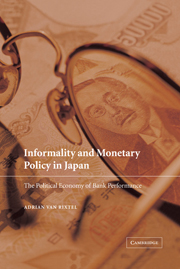Book contents
- Frontmatter
- Contents
- List of figures
- List of tables
- Acknowledgements
- 1 Introduction
- Part I Theory
- Part II The institutions and their policies
- 5 Informality, monetary authorities and monetary policy: the pre-1998 reform regime
- 6 Informality, banking crisis and financial reform: 1998 and beyond
- Part III Empirical evidence
- Bibliography
- Index
5 - Informality, monetary authorities and monetary policy: the pre-1998 reform regime
Published online by Cambridge University Press: 22 September 2009
- Frontmatter
- Contents
- List of figures
- List of tables
- Acknowledgements
- 1 Introduction
- Part I Theory
- Part II The institutions and their policies
- 5 Informality, monetary authorities and monetary policy: the pre-1998 reform regime
- 6 Informality, banking crisis and financial reform: 1998 and beyond
- Part III Empirical evidence
- Bibliography
- Index
Summary
A son who wins entry to the MOF's elite track at the age of 22 or 23 earns his family as much distinction as if he had won a Nobel Prize … MOF men truly are Nobel-caliber: brilliant, creative, tenacious, public-spirited. Many of them would probably win Nobel Prizes if they chose careers that tend to catch the eye of the Royal Swedish Academy of Sciences.
E. Fingleton (1995)Introduction
In this chapter, the organisation in general and informal policies in particular of the two major monetary authorities in Japan – the Ministry of Finance (MoF) (ōkurashō) and the Bank of Japan (BoJ) (Nihon Ginkō) – until 1998 will be discussed. The year 1998 is chosen because in my view it was a turning point in the post-war development of the Japanese financial system and monetary policy. In this year the major reform programme dubbed the ‘Big Bang’ started, a new version of the Bank of Japan Law was adopted, bank supervision was removed from the MoF to a new independent organisation (Financial Supervisory Agency), other important reorganisations of the MoF and BoJ were implemented, the issuance of tsūtatsu was restricted and last, but certainly not least, measures were implemented to solve finally the severe banking crisis.
- Type
- Chapter
- Information
- Informality and Monetary Policy in JapanThe Political Economy of Bank Performance, pp. 91 - 164Publisher: Cambridge University PressPrint publication year: 2002



